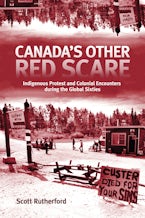"I was truly impressed with this book. Rutherford provides detailed insights into historical developments in the Kenora region and the post–World War II racism that is so fundamental in shaping current Indigenous realities. The almost seamless integration with global political commentary and international debates is simply superb. There are tough concepts presented here – and folks will find them uncomfortable – but a study like this is much overdue and will attract considerable international attention." Ken Coates, Johnson-Shoyama Graduate School of Public Policy, University of Saskatchewan "Kenora, a small city in northwest Ontario, rarely makes headlines in Canadian news. However, for six weeks during the summer of 1974 Kenora gained national attention when 150 Anishinaabe "Ojibway Warriors" occupied a city park as part of a decolonizing protest in connection with the American Civil Rights and American Indian Movements, global Marxism, and decolonization efforts happening throughout what was then called the Third World. Kenora is effectively used as a microcosm to analyze racial and class tensions that pervaded and continue to pervade Canada as a whole. This is essential and accessible reading for anyone interested in understanding the continued resurgence of Indigenous protest in the face of an unchanging racist and settler colonial Canadian state and society. Essential. All levels." Choice "In a manner that other settler historians might emulate, Rutherford deftly positions himself in the narrative without imposing an authoritative voice. Thought provoking and illuminating, the book shows how knowledge of past struggles for justice can illuminate today's challenges as Indigenous people continue to combat the consequences of settler colonialism." J.J. Talman Award, Ontario Historical Society Jury "Canada's Other Red Scare contains challenging arguments built on exemplary research. It also reveals one pivotal yet understated contribution in its connection to the personal. Rutherford begins and ends this book by situating himself in his research. His introduction makes clear his motivations for wanting to understand Indigenous political mobilizations around Kenora – his hometown – which helps him to personally and professionally come to terms with his role in settlercolonialism and racialized histories that deliberately erased Indigenous peoples as active historical subjects. In many ways, this work enabled Rutherford to unlearn the history of Kenora that dominated his childhood and punctuated his formative memories, while also providing sophisticated interventions into Canadian historiography." Histoire sociale/Social History

